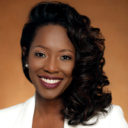When I started in philanthropy in 2016, I was given an extraordinary opportunity: to create an initiative at the intersection of climate change, water, and inequity. These issues are profoundly interconnected, but back then, the intersection remained unexplored and unaddressed.
I have a personal reason to care deeply about these issues. As a native Detroiter, I have seen low-income people and communities of colour suffer disproportionately from devastating floods. The drivers of this unequal impact are complex. First, there is extreme precipitation driven by climate change, which is stressing a system of ageing and poorly maintained pipes and pumps. There is a complex, fragmented water sector. And there are deeply entrenched inequities, including structural and institutional racism, in the policies, practices, and responses of water-sector leaders and institutions. These interconnected challenges leave communities – including those of my friends and family – literally in deep water, drowning without a lifeline.
In response, The Kresge Foundation launched the Climate Resilient and Equitable Water Systems (CREWS) Initiative. Since 2016, the Foundation has invested some $10 million to grow a field of practice at the intersection of these three issues.
To grow that field, we knew we had to go beyond funding the typical partners and perpetuating the same silos. We needed to define the field and connect new and existing players to develop integrated solutions. And we needed to create a community of learning and practice to allow a diverse group of actors – community organisers, utility leaders, researchers – to learn from one another and collaborate.
CREWS convenes grantee partners in ways that prioritise network building and co-learning. Annual in-person meetings bring together over 100 grantees for three days. These gatherings allow new and unusual partnerships to form: community flood groups working with lawyers; economic analysts working with social justice organisations; and researchers compiling data to support on-the-ground advocacy. In addition to the convenings, CREWS hosts webinars, community service projects, in-person meet-ups at water-related events, and peer clinics on topics of interest.
We have seen the importance of supporting organisations that place equity at the centre of their work, including environmental justice organisations like Eco-Action, Deep South Center for Environmental Justice, and Milwaukee Water Commons. These groups serve as models for predominately white networks of water leaders and organisations that need support to realise their commitment to transformation and how to incorporate equity throughout their work. We appreciate organisations like River Network, Green Infrastructure Leadership Exchange, and the Southeast Sustainability Directors’ Network for their humility and willingness to learn from frontline leaders.
We also seek to develop climate-smart, equitable water management practices in a field where there are few such models. To that end, we have invested heavily in training and technical assistance to build organisations’ ability to integrate a racial equity lens into their work and to use climate data to inform their planning. Early evidence suggests that this type of support is highly valued and that our partners are beginning to incorporate what they learn into their work. For example, the U.S. Water Alliance’s Climate Resilience Bootcamp, created a ‘table’ for utilities and local communities to come together, resulting in tangible policy wins and stronger relationships.
We are also supporting the new field of practice by using multiple forms of capital – grants and social investments – to demonstrate how financial incentives can encourage more equitable water systems. This has allowed us to explore the use of place-based, innovative investment vehicles like Environmental Impact Bonds, Joint Benefits Authorities, water infrastructure districts, and mission-driven project development.
Most importantly, we have learned that philanthropy can play an important role in building a new field by connecting leaders in related sectors, developing practices that are equitable and climate-resilient, and taking risks on emerging practices that may launch more equitable solutions. That’s good news for my friends and family in Detroit – and in other communities where climate change and inequity magnify existing challenges.
Dr Jalonne L. White-Newsome is a Senior Program Officer in the Environment Program, The Kresge Foundation. You can find her on Twitter at @drj_ege2 or reach her by email at jlwhite-newsome@kresge.org. The Kresge Foundation’s environment work can be found at @kresgenviro.






Comments (2)
Just keep up doing the well done job,and help persons who are in need to be more than resilience with our environment,specially in this time that our Government doesn't want to help us,and our environment is very unhealthy for our seniors and children we must provide a healthy Environment.
Just keep up doing the well done job,and help persons who are in need to be more than resilience with our environment,specially in this time that our Government doesn't want to help us. With all our Respect Efrain Saucedo and members of our organization.